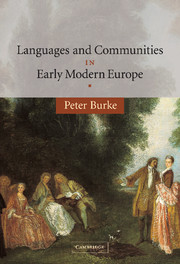Book contents
- Frontmatter
- Contents
- Acknowledgements
- Chronology 1450–1794
- Prologue: communities and domains
- 1 ‘Speak, that I may see thee’: the discovery of language in early modern Europe
- 2 Latin: a language in search of a community
- 3 Vernaculars in competition
- 4 Standardizing languages
- 5 Mixing languages
- 6 Purifying languages
- Epilogue: languages and nations
- Appendix: languages in Europe 1450–1789
- Bibliography
- Index
2 - Latin: a language in search of a community
Published online by Cambridge University Press: 07 December 2009
- Frontmatter
- Contents
- Acknowledgements
- Chronology 1450–1794
- Prologue: communities and domains
- 1 ‘Speak, that I may see thee’: the discovery of language in early modern Europe
- 2 Latin: a language in search of a community
- 3 Vernaculars in competition
- 4 Standardizing languages
- 5 Mixing languages
- 6 Purifying languages
- Epilogue: languages and nations
- Appendix: languages in Europe 1450–1789
- Bibliography
- Index
Summary
In the last chapter, we saw how some people objected to the employment of Latin in church and in the courts because it excluded the majority of the population from the community of interpretation. Here, by contrast, the focus will be on inclusion, on the community or communities whose cohesion was expressed, encouraged or constructed by the use of that; language.
A discussion of Latin provides a good opportunity for noting continuities between the early modern period and the Middle Ages, before turning to the changes. In medieval and early modern times alike, Latin offers a classic example of ‘diglossia’ (above, p. 7), in the sense that it was considered appropriate to use that language in some situations and domains. Rules become more visible when they are broken, so that one of the traditional conventions for the use of Latin is revealed when the sixteenth-century Polish Cardinal Stanislas Hosius chided a colleague, bishop Jakub Uchański, for writing to him about theology in the vernacular.
The case of Latin also allows us to return to some of the problems that, as we have seen (above, p. 5), the concept ‘community’ brings in its train, since by the ninth century, if not before, Latin had turned into a language without native speakers. For this reason, post-classical Latin has been called a language ‘without a people’ or ‘without a speech community’ (Eine Sprache ohne Sprachgemeinschaft).
- Type
- Chapter
- Information
- Languages and Communities in Early Modern Europe , pp. 43 - 60Publisher: Cambridge University PressPrint publication year: 2004
- 1
- Cited by

